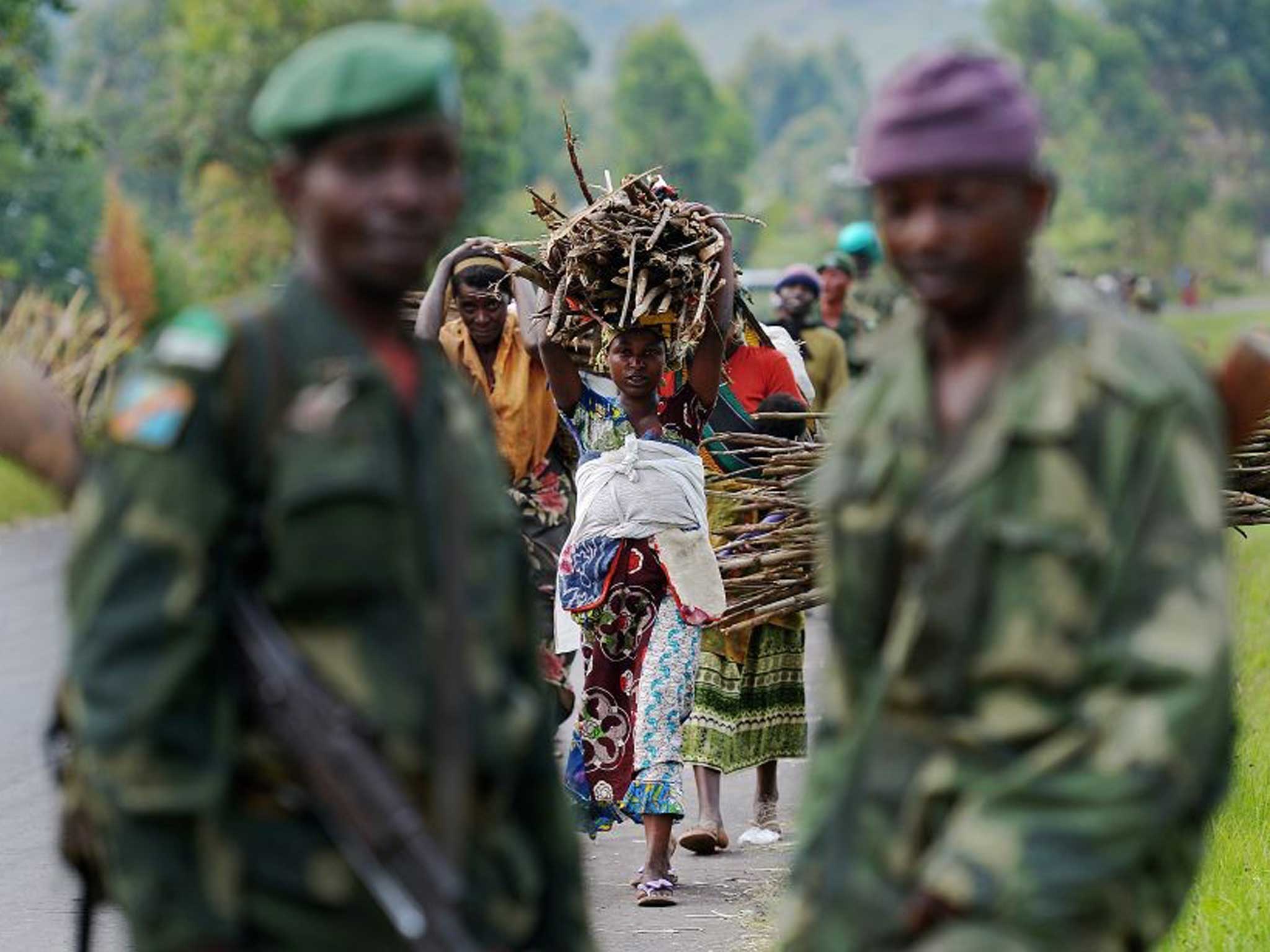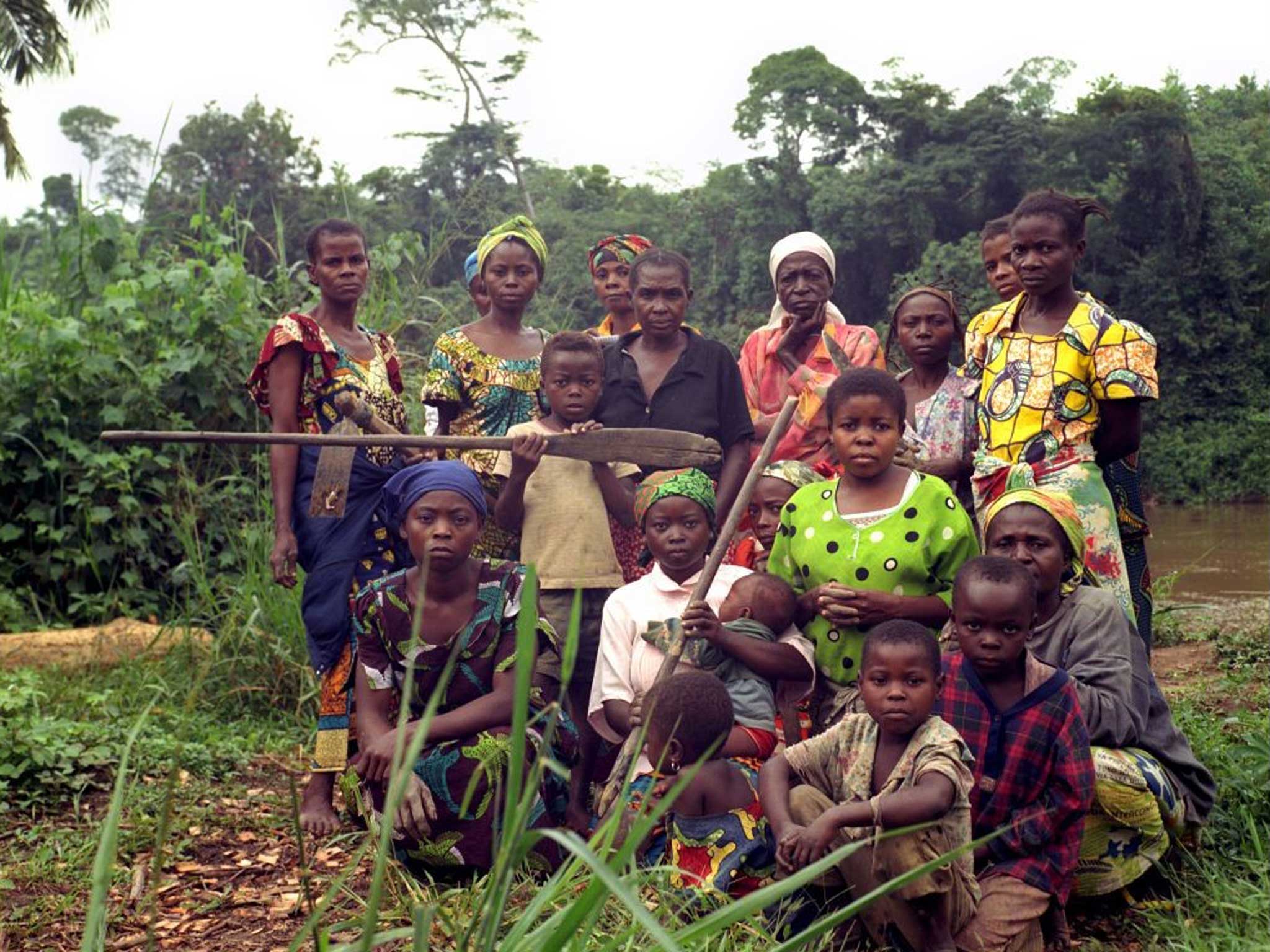Exclusive: As the Democratic Republic of Congo suffers another day of bloodshed, its soldiers talk with astonishing candour of their own brutality
Officially the country is at peace, but murder and rape are ever-present threats

Your support helps us to tell the story
From reproductive rights to climate change to Big Tech, The Independent is on the ground when the story is developing. Whether it's investigating the financials of Elon Musk's pro-Trump PAC or producing our latest documentary, 'The A Word', which shines a light on the American women fighting for reproductive rights, we know how important it is to parse out the facts from the messaging.
At such a critical moment in US history, we need reporters on the ground. Your donation allows us to keep sending journalists to speak to both sides of the story.
The Independent is trusted by Americans across the entire political spectrum. And unlike many other quality news outlets, we choose not to lock Americans out of our reporting and analysis with paywalls. We believe quality journalism should be available to everyone, paid for by those who can afford it.
Your support makes all the difference.The Congolese soldiers march through the night, but not towards battle. In the dark, they are hunting for women who have fled their homes in Minova to hide in the bushes. The women know that if they are seen, they will be raped and maybe killed.
The army has been ordered to retreat to the town, in the eastern Democratic Republic of Congo. Its young soldiers, 2,000 of them, fire gunshots in the air.
The commander gives an order. "Go and rape women," he says. The soldiers obey.
"It's true that we raped here. We found women because they can't escape. You see her, you catch her, you take her away and you have your way with her," says one soldier later. "Sometimes you kill her. When you finish raping then you kill her child. When we rape, we feel free."
Nzgira was one of the victims on that night in November 2012, when the mass rape took place. Three men attacked her at once, two of them from the front. She says: "The other said he wouldn't go where the others left their dirt. So the third took me from the back. I thought I was going to die."
The women had been raped by militia groups before, but this time their Congolese brothers were their torturers. "I didn't see their faces," says Nzgira. "How do you see someone who is hitting you in the eyes? How will you know someone who is inserting a gun barrel in your mouth?"
Masika, the founder of a rescue centre for rape survivors, said: "They made me sit and started touching me," she remembers. "All the children were around me. Then they started to rape women from the dormitories [of the rescue centre]."
Masika was 15 when she was first raped by a schoolteacher. Later, the militia raped her and her two daughters before killing her husband. After being cast out by her parents-in-law, she decided to offer counselling and shelter to other women who had experienced the same trauma.

She has now become a target for the rapists. "Since I have been doing this work, I have been raped three times," she says. "I have been beaten, tortured and left to die." On one occasion, a soldier raped her with his foot.
"When he finished, he spat on me. That's when I thought about killing myself. I am constantly haunted by this," she says.
The mass rape in Minova was not an isolated instance. Research from the American Journal of Public Health says that in the Democratic Republic of Congo (DRC), 1,152 women are raped every day, or 48 women every hour. Despite the Congo's conflict officially ending in 2003, fighting has never stopped, claiming more than five million lives since the war started nearly two decades ago. Throughout, sexual violence has continued. A total of 12 per cent of the female population of the DRC have been raped at least once.
Sexual violence in conflict is a worldwide issue, but in the DRC it is so endemic that it has earned the Central African country a reputation as most dangerous in the world for women. Minova is a market town in South Kivu, on the border with North Kivu, the region with the highest concentration of sexual abuse in the DRC. An attack in South Kivu yesterday killed 37 people, including 18 women and eight children, who had been shot, stabbed or burned inside their homes.
The day after the army attack in Minova, 130 rape victims arrived at Masika's displaced women's camp. Seventeen of the girls were under 18. The youngest was 11.
"The pain of these women is created by Congolese men," says Masika, who is featured in a new documentary by the award-winning film-maker Fiona Lloyd-Davies. "Every day, they take the women and rape . You see a three-year-old child who has been raped. Why would they do that?"
Rob Williams, the chief executive of War Child UK, a charity working to reduce rape in the Congo, says that sexual violence rises in conflict because men lose their role in society, are sometimes mentally scarred, and able to commit crimes with little consequence. "The sense of law and order collapses. It's not just the police forces becoming ineffective; the community structures that help police behaviour collapse," he says.
He adds that sexual violence in conflict is used by the military as a way of weakening opposition. "We've seen cases where sticks have been used, or bottles, or rifle butts, or even bayonets," he says. "Obviously, there is very little about sex there, it's mostly about an experience of horror and power." This kind of rape is experienced by both men and women, with victims often dying from their injuries.
Rape has been used as a weapon in war throughout history. To take recent examples, in the Bosnian conflict in the early 1990s, Muslim teenage girls were systematically targeted. In Darfur, women were subject to sexual attacks from the Sudanese army, as well as from the rebels and the Janjaweed militia.
There were claims that forces loyal to the Libyan leader Muammar Gaddafi carried out a campaign of rape during clashes with rebels who eventually ousted the dictator. In a survey of families affected by the conflict, 259 women said that they had been raped, but the actual number is thought to be far higher.
Nor is the physical act of rape the end of the nightmare. The stigma surrounding Congolese rape survivors often means they are more likely to be cast out from their villages or leave for displaced people's camps and cities. "Rape destroys communities as well as destroying people," Williams says.
However, the organisers of a summit against sexual violence to be held this week in London hope that this can change. The four-day End Sexual Violence in Conflict conference, starting on Tuesday, will be co-hosted by the Foreign Secretary, William Hague, and the actress Angelina Jolie, who have been campaigning together on this issue for the past two years.
The main aim of the summit is to ensure that people who commit crimes can be arrested and successfully prosecuted. It is a process that relies on peacekeepers and local authorities being able to effectively investigate and document cases of rape. "In some countries, it is not normal to investigate rape, as it isn't seen as a high priority," says Williams.
The Minova massacre is one of the few cases that resulted in a trial, but of the 39 soldiers accused, only two ended with convictions for rape.
Lloyd-Davies' documentary Seeds of Hope, which will have its premiere on Tuesday, focuses on Masika's mission to help rape victims to rebuild their lives.
The director hopes to portray the women as survivors, not just faceless victims. "Can anyone really recover completely from the kind of violence they've had to endure? What you do see is that they are surviving, and are getting on with their lives – some better than others. Masika gives them a sense of self and confidence that helps them move on," Lloyd-Davies said.
Masika, she says, is one of the reasons why she keeps being drawn back to the DRC: "She's an extraordinary character, there's an inspirational sense in everything she does. Her story is so profound and touching."
Interviewing perpetrators of rape, on the other hand, can be chilling, but she adds: "It's important to find out their motivation, to try to understand what goes through their mind, in order to stop this from continuing.
"Sometimes young men are kidnapped at a very young age and forced to do repugnant things. They're numb, they have been skewed, they have a different sense of what is normal. But this doesn't mean they're not aware of what they're doing."
The soldiers in Lloyd-Davies' documentary describe their actions in vivid details while masked by a shade that protects their identity. "The commander gave us an order and he was the one who started to do it," says one. "There was shooting everywhere. He told us to surround him so he wouldn't get shot. Then he started raping. When we enter homes, we open the door and find them hiding. They try to scream so we tell them to stop screaming. When we see that she is screaming sometimes we let her go. Or you'll find her hiding in the bush and have sex with her there."
One soldier in Lloyd-Davies' documentary does express remorse. But he says that he would not admit his crimes unless his superiors were brought to justice. "They are the ones who sent us," he says. "If those who committed these crimes can be arrested and judged, then that would be good."
Lloyd-Davies's youngest interviewee shows no repentance, however. He speaks without hesitation: "We met other people and we killed just for the sake of it. We raped, we destroyed everything. Everything that was in our path."
Seeds of Hope is supported by the Pulitzer Center on Crisis Reporting and will be screened at the Global Summit to End Sexual Violence in Conflict on Tuesday
Join our commenting forum
Join thought-provoking conversations, follow other Independent readers and see their replies
Comments